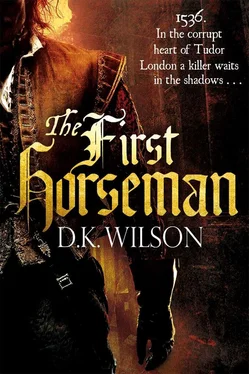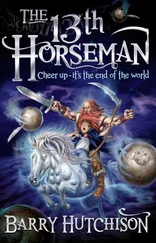D. Wilson - The First Horseman
Здесь есть возможность читать онлайн «D. Wilson - The First Horseman» весь текст электронной книги совершенно бесплатно (целиком полную версию без сокращений). В некоторых случаях можно слушать аудио, скачать через торрент в формате fb2 и присутствует краткое содержание. Год выпуска: 2013, ISBN: 2013, Издательство: Little, Brown Book Group, Жанр: Исторический детектив, на английском языке. Описание произведения, (предисловие) а так же отзывы посетителей доступны на портале библиотеки ЛибКат.
- Название:The First Horseman
- Автор:
- Издательство:Little, Brown Book Group
- Жанр:
- Год:2013
- ISBN:9781405518871
- Рейтинг книги:5 / 5. Голосов: 1
-
Избранное:Добавить в избранное
- Отзывы:
-
Ваша оценка:
- 100
- 1
- 2
- 3
- 4
- 5
The First Horseman: краткое содержание, описание и аннотация
Предлагаем к чтению аннотацию, описание, краткое содержание или предисловие (зависит от того, что написал сам автор книги «The First Horseman»). Если вы не нашли необходимую информацию о книге — напишите в комментариях, мы постараемся отыскать её.
The First Horseman — читать онлайн бесплатно полную книгу (весь текст) целиком
Ниже представлен текст книги, разбитый по страницам. Система сохранения места последней прочитанной страницы, позволяет с удобством читать онлайн бесплатно книгу «The First Horseman», без необходимости каждый раз заново искать на чём Вы остановились. Поставьте закладку, и сможете в любой момент перейти на страницу, на которой закончили чтение.
Интервал:
Закладка:
I thought of the Seagrave clan. Could this be a revenge attack? ‘It seems a strange coincidence that I was due to meet Robert there and that the killer was lying in wait for someone named Thomas.’
There was a long silence broken, at last, by the thoughtful Bart. ‘Did anyone else know about this meeting?’
‘Not unless Robert told someone,’ I said. ‘It was only arranged last night.’
‘Then you must not reproach yourself,’ he replied. ‘You cannot know that the murderer mistook his target.’
‘Don’t be an ass, Bart!’ his friend snapped. ‘If the assassin made a mistake, Master Treviot has a serious enemy and may still be in danger. ’Tis that that worries him.’
‘Nay, I’ve no care for myself,’ I said. ‘I would gladly have taken that shot in my own body to save the life of a better man than I will ever be. Thank you, gentlemen, for your help and your time.’ I took a noble from my purse. ‘Here’s some recompense. I wish you better fortune with your churlish masters.’ I set off back along the street.
All that day I gave little thought to my work. Customers came and went. John Fink had accounts and orders for materials that needed my approval. But I did no more than go through the motions. There was a numbness in my soul and a buzzing confusion in my head. As soon as the shutters went up for the day, I called upon Margaret Packington. I found her in shock and grief with two close friends who were helping her cope. I muttered a few woefully inadequate words and after a brief stay took my leave.
Most of the next night I wrestled, sleeplessly, with accusing thoughts and answerless questions. If Robert’s death was, in some way, my fault, I would never be able to forgive myself. But was it my fault? I had enemies — that much was certain. Would any of them go as far as murder? Simon Leyland had made his hostility well known and had business difficulties but I could not imagine him resorting to such desperate measures. Seagrave’s family? I recalled Ned’s nervousness about a backlash to the courtier’s death. How far might they go in pursuit of revenge? And, anyway, my thinking always came up against the same obstacle: how could any harbourers of ill-will possibly have known I was going to be on that street before dawn. The arrangement had been made only a matter of hours before and I, certainly, had told no one. Which left Robert himself as the only possible source of the information. Yet, if he had been the intended victim, how could the assassin’s behaviour be explained? To waylay his victim in front of witnesses when he could have done so in the seclusion of Sopers Lane? To use a gun that would draw attention to the crime rather than a silent knife? Such actions did not suggest the work of a rational mind. Could it be that this was, after all, a random killing, the action of a madman?
At some point in the early hours I quit my bed’s tumbled sheets and lit a candle. I became aware of noises outside and opened the shutters to peer out. I saw a group of men carrying lanterns and armed with staves. Two of them wore common soldiers’ helmets. All were bundled up with thick cloaks against the dank night air. One appeared to be issuing orders and I recognised him as our current ward constable. He divided his force into two groups and led one further along West Cheap; the other set off towards the Standard and Poultry. So, I thought, the watch has been put on alert. A pity they were not more attentive twenty-four hours since.
I took out the copy of Tyndale’s book that Robert had given me but before I began to read another thought struck me. Robert had but just returned from the Netherlands where, to judge from his brief letters, he had been in some difficulty, perhaps in danger. I recalled what he had said about Tyndale’s death — strangled and burned for a heretic. Since Robert held the author in such high regard, could it have been that he, too, had fallen foul of the Dutch authorities? Might some agent of their Catholic rulers have followed him to London with orders to kill him? I recalled Robert’s last, brief note, ‘I am returned safely and have much to tell you.’ What dark news had he been bringing from over the sea? Was he silenced to stop him passing it on?
So many questions. No answers. The coroner was seeking them in his own ponderous way but I had little confidence in his ability to uncover the truth. My easiest option would have been to leave everything to the authorities but that was not possible — not only because of the outrage I felt at my friend’s brutal and cowardly murder, but also because I did not know whether I was safe. And, if my life was under threat, might not the same be true of those closest to me? Anxiety impelled me to make an urgent journey to Hemmings.
Chapter 12
I was out on the Rochester and Canterbury road by first light, riding with a pair of well-armed servants. I had to get down to the manor as quickly as possible. An ungovernable fear gripped me: might not the mysterious assassin or his paymaster have marked my mother and son for death? If I was their target, they would soon have realised that their plot had failed. The news of Robert’s murder had been all over London within a couple of hours. For aught I knew, fresh plans were already afoot for another attempt on my life and, if on mine, why not also on the lives of those I loved?
There was another reason for my impromptu visit — I wanted to see Lizzie. One clear idea that had disentangled itself from the nocturnal jumble in my mind was that she might be able to help me. She had spent much of her life in the company of violent men — desperate vagrants, soldiers turned highway robbers, child-stealing gypsies, hucksters of every hue and cut-throats who would, as they said, ‘skene a weasand-pipe’ for a purseful of groats. The more I thought about the events of the previous day, the more convinced I became that the assassin must be a professional. That or a madman. He could obviously handle an arquebus with deadly accuracy (though just how he had managed it was still a mystery). He was bold enough to discharge his weapon in full view of other people, and agile enough to make his getaway quickly and safely. As I rode along the rutted road between trees silvered with frost, I tried to form a mental picture of Robert’s slayer. If I discounted the idea of a lunatic, it seemed that the man we were dealing with must be one who was not new to his craft. He had killed before. Whether or not he was foreign, he must be someone existing on the margins of society, a member of the law-defying underworld. He could not live in total isolation. He needed accomplices; people he could turn to for contacts, for shelter, for information. If I could gain access to that criminal Hades, I might be able to find some leads.
We reached Hemmings late in the afternoon. I saw Dickon stabled, took a few loosening strides round the yard and splashed icy water from a butt over my face. Then I went indoors through the domestic quarters. Entering the small hall from the screens passage a wave of warm air met me. A good fire blazed in the hearth and a semicircle of chairs and stools was arranged before it. I approached this barrier and found Lizzie kneeling on the rushes with little Raphael. She was holding out a bright red apple to him and encouraging him to walk in order to grasp it. Both of them were absorbed in the game and I was able to watch unnoticed for several seconds. The boy seemed very sturdy as he wobbled forward, holding out one hand for the fruit and clutching his skirts with the other. His hair was darkening now and when I looked at him I did not automatically think of Jane. When he fell, Lizzie did not lift him; she simply waved the apple until Raphael got to his feet unaided.
‘The boy is doing well,’ I said quietly.
Читать дальшеИнтервал:
Закладка:
Похожие книги на «The First Horseman»
Представляем Вашему вниманию похожие книги на «The First Horseman» списком для выбора. Мы отобрали схожую по названию и смыслу литературу в надежде предоставить читателям больше вариантов отыскать новые, интересные, ещё непрочитанные произведения.
Обсуждение, отзывы о книге «The First Horseman» и просто собственные мнения читателей. Оставьте ваши комментарии, напишите, что Вы думаете о произведении, его смысле или главных героях. Укажите что конкретно понравилось, а что нет, и почему Вы так считаете.












